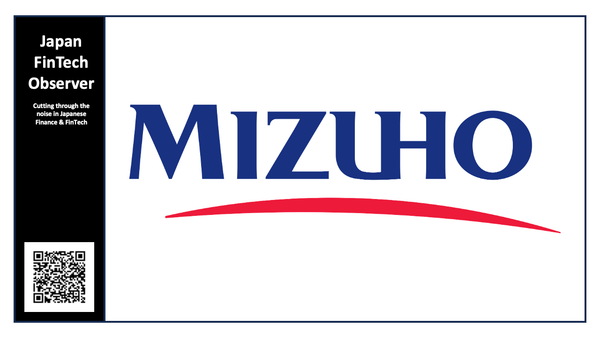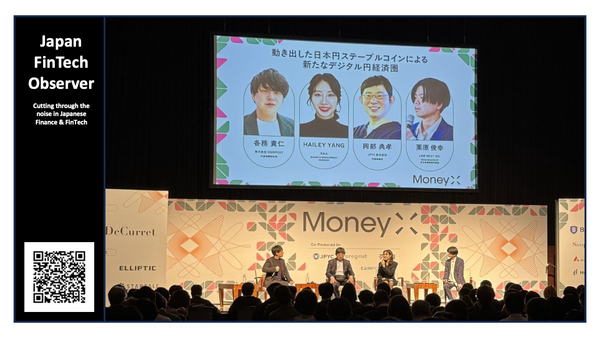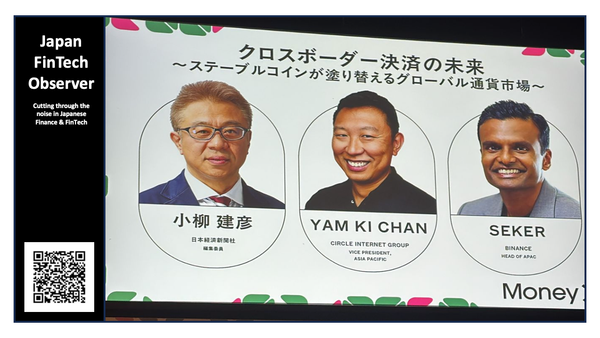Japan FinTech Observer #118

Welcome to the one hundred eighteenth edition of the Japan FinTech Observer.
We are going to be a bit policy- and white paper-heavy this week. From a macro perspective, we have included the government's "Grand Design and Action Plan for a New Form of Capitalism, 2025 Revised Edition" as well as METI's "White Paper on International Economy and Trade".
The Digital Agency has published an important "Guideline for Data Governance", and The Japan Research Institute contributed a strategy paper on "Finance x Generative AI.
Lastly, the Financial System Council General Meeting discussed the state of the Japanese crypto asset ecosystem and future regulation, which would align a significant part of the crypto assets with securities law (and associated taxation).
Here is what we are going to cover this week:
- Venture Capital & Private Markets: SBI Investment has completed fundraising for the “SBI Digital Space Fund”, with total capital commitments reaching JPY 100 billion; Daiwa Securities plans to launch a real estate fund with Osaka-based developer Samty and fund manager Hillhouse Investment
- Banking: SBI Shinsei Bank will repay the remaining public funds of approximately 230 billion yen by the end of July and subsequently move to re-list; Raksul Bank has signed a BaaS (Banking as a Service) usage agreement with GMO Aozora Net Bank; nCino announced that SBI Credit Guarantee has adopted nCino's cloud-based integrated banking platform; Natixis Corporate & Investment Banking (CIB) announced the establishment of its banking branch in Japan from July 1, 2025
- Payments: the "New AEON Pay" has been launched; Digital Garage has begun providing the Business Invoice Payment Service (BIPS) to "DX Connect Gate"; Nippon Yusen Kabushiki Kaisha has reached an agreement to acquire 100% of Kadmos; Fintech startup HeyMax plans to enter Japan and Hong Kong later this year
- Capital Markets: The reorganization of overseas securities entities within MUFG will be delayed until October 1, 2025; the third revision of Japan's Stewardship Code has been published; the SESC has submitted three recommendations for the strengthening of market surveillance functions
- Digital Assets: the Financial System Council has reviewed the current status of and the regulatory framework for crypto assets in Japan; the JCBA has presented its business report for Fiscal Year 2024
- The Last Word: The Digital Agency's Data Governance Guideline
Finance x Generative AI

The Japan Research Institute has published "Finance x Generative AI: Case Study and Strategy".
Generative AI is increasingly adopted in the financial sector to drive automation, improve customer experience, and enhance risk management. At the same time, challenges such as use case selection, data infrastructure, and AI-specific risks are becoming more apparent.
This report compares global trends and presents six strategic actions for major Japanese financial firms to secure long-term competitiveness. While Japanese firms show strong governance and solid business application, contrasts were observed: the U.S. is aggressive, Europe is cautious, and China is rapidly operational.
To build an edge, Japan must pursue the following six pillars:
- Set a vision and goals focused on value creation and growth
- Optimize investment decisions for the AI era
- Discover promising use cases
- Combine external tech with structured internal knowledge
- Strengthen risk management
- Build AI units and grow talent strategically
Venture Capital & Private Markets
- SBI Investment has completed fundraising for the “SBI Digital Space Fund”, with total capital commitments reaching JPY 100 billion; in March 2023, the SBI Group established SBI PE Holding as an intermediate holding company to oversee its private equity business; the PE investment business, one of the SBI Group’s five core business segments, is eager to rapidly expand its assets under management to JPY 1 trillion; to support this goal, SBI Investment has been actively establishing new funds; with the launch of this latest fund, SBI Investment's total cumulative fund commitments have now reached JPY 841.4 billion
- Daiwa Securities plans to launch a real estate fund with two partners, tapping investor demand for a piece of Japan’s booming property market; the Japanese brokerage will collaborate with Osaka-based developer Samty and fund manager Hillhouse Investment, aiming to raise ¥100 billion ($690 million) via a private fund for domestic and overseas institutions
METI's 2025 White Paper on International Economy and Trade

The Ministry of Economy, Trade and Industry (METI) has released the 2025 version of its annual White Paper on International Economy and Trade, which was presented to the Cabinet on June 27, 2025. The White Paper analyzes the international economic trends and policies of overseas countries that may have impacts on trade, thereby contributing to the formulation of Japan’s trade policies.
We also offer an extended audio explainer of the white paper:
Banking
- SBI Holdings has decided the policy to repay the current remaining public funds of SBI Shinsei Bank, amounting to approximately 230 billion yen on July 31, 2025, with SBI Holdings bearing the full amount, as agreed between SBI Holdings, SBI Shinsei Bank, the Deposit Insurance Corporation of Japan, and The Resolution and Collection Corporation in March 2025; following the full repayment, SBI Shinsei Bank aims for a re-listing on the Tokyo Stock Exchange as soon as possible
- Raksul Bank has signed a BaaS (Banking as a Service) usage agreement with GMO Aozora Net Bank, toward the launch of services within 2025; the Raksul Group has served customers including over 3 million registered SMEs through comprehensive business support in printing, advertising, and other areas; through this experience, Raksul has strongly felt that financial challenges are hindering corporate growth
- nCino announced that SBI Credit Guarantee has adopted nCino's cloud-based integrated banking platform as the business infrastructure for its mortgage guarantee business that began in April 2025, and has commenced full-scale operations
- Natixis Corporate & Investment Banking (CIB) announced the establishment of its banking branch in Japan from July 1, 2025; the banking license will enhance Natixis CIB’s service offering in Japan, enabling its Natixis Tokyo Branch to provide a broader range of financial services for clients; the Natixis Tokyo Branch has been operating under a money lending license since June 2022 and building up its lending business since then
- The Financial Services Agency held an opinion exchange meeting on financial crime prevention measures with the management of 13 neobanks at the beginning of June; this was conducted against the backdrop of diversifying customer needs and the advancement of cashless payments, where new forms of banks with distinctive business models are gaining prominence - such as banks that provide services exclusively online and banks that primarily provide payment services by installing ATMs in convenience store networks
Payments
- The "New AEON Pay" has been launched, combining the legacy AEON Pay and WAON electronic money services, and creating a unified mobile payment platform; the integration aims to create a more comprehensive mobile payment ecosystem while maintaining AEON's focus on community support and customer rewards
- Digital Garage has begun providing the Business Invoice Payment Service (BIPS) to "DX Connect Gate", a platform for streamlining accounting operations such as invoice receipt and payment, jointly developed by TIS and Hiroshima Bank for regional banks; as the first phase of this project, invoice card payment functionality has been implemented in "Hirogin Smart Fine," a DX digital solution for Hiroshima local companies
- Nippon Yusen Kabushiki Kaisha (NYK) has reached an agreement to acquire 100% of Kadmos, a global end-to-end maritime salary payments platform provider headquartered in Germany; in 2019, NYK established MarCoPay in Manila, Philippines, as a financial services platform; MarCoPay has since evolved to offer loans and insurance designed to support the well-being of Filipino seafarers and their families; together, Kadmos and MarCoPay will uniquely provide comprehensive salary payment solutions to seafarers worldwide while also addressing the unique needs of the Filipino seafarer community
- Fintech startup HeyMax, which lets travellers earn rewards seamlessly across several merchants, plans to enter Japan and Hong Kong later this year, and Korea and Taiwan by 2026, to tap into the growing travel economy. HeyMax CEO Joe Xizhi Lu expects HeyMax users to hit a million by 2026 from 120,000 now, and plans to double partner merchants to 1,000
- Mizuho's Dan Dolev gives his bullish case for payments stocks
Grand Design and Action Plan for a New Form of Capitalism, 2025 Revised Edition

The "Grand Design and Action Plan for a New Form of Capitalism, 2025 Revised Edition," was approved at a Cabinet meeting on June 13, 2025. It is a comprehensive policy blueprint from the Japanese government outlining its strategy to fundamentally reshape the nation's economy. It presents a vision to transition away from the deflationary mindset that has characterized the past three decades and establish a new, growth-oriented economic model. The central thesis of the plan is that a virtuous cycle of robust wage growth and active investment is the key to achieving sustainable prosperity. This summary will elaborate on the key pillars of this ambitious plan.
The plan's introductory chapter frames the current moment as a historic turning point for Japan. After years of effort, the nation is seeing positive signs, such as two consecutive years of wage increases exceeding 5% in spring labor negotiations and nominal GDP surpassing 600 trillion yen. The core objective is to solidify these gains and create a "growth-oriented economy." To achieve this, the government aims to establish a new societal "norm" where real wage growth consistently surpasses 1% annually, meaning wage increases must outpace inflation. This is described as the very starting point of the new growth strategy.
Capital Markets
- The reorganization of overseas securities entities within MUFG, originally planned to be completed by July 1, 2025, still has pending approvals from the relevant regulatory authorities in Japan and abroad, and therefore has been moved to an October 1, 2025 target date
- The third revision of Japan's Stewardship Code, partially building on the law revision to clarify the scope of joint holders of the large reporting rules, reflects the recommendations of the Action Program 2024 and is aimed at promoting collective/collaborative engagement and increasing the transparency of beneficial shareholders; furthermore, for the first time, the Code has been streamlined to make the Code more principles-based; the revisions are expected to lead to self-motivated changes occurring in the mindsets of investors, contributing to deeper and more effective dialogue between companies and investors
- The Securities and Exchange Surveillance Commission (SESC) has submitted three recommendations for the strengthening of market surveillance functions to the Prime Minister and the Commissioner of the FSA: (I) expanding insider trading regulations to cover more types of related parties, (II) strengthening administrative monetary penalties by increasing amounts and expanding scope to improve deterrent effects, and (III) enhancing inspection and investigation capabilities through various measures including expanded powers and international cooperation; the SESC emphasizes the need for these reforms as Japan works towards becoming an "asset management powerhouse" while ensuring fair and transparent markets for all investors
- The Study Group on Financial Infrastructure for Carbon Credit Trading began in June 2024 and conducted a total of seven meetings; through hearings with stakeholders primarily from the financial sector, the group worked to understand the actual situation of carbon credit trading while discussing initial issues and other topics; based on these discussions, the Study Group has compiled and now has published the "Report of the Study Group on Financial Infrastructure for Carbon Credit Trading"
- The Ministry of Finance has published its JGB Newsletter for June 2025
Digital Assets
- The Financial System Council has reviewed the current status of and the regulatory framework for crypto assets in Japan; the regulatory approach aims to balance user protection with innovation promotion, recognizing cryptocurrency's potential role in Japan's digital economy development; the framework acknowledges that while cryptocurrencies have high volatility, they can serve as alternative investments for sophisticated investors with appropriate risk assessment capabilities; it specifically calls for two categories of crypto assets to be established, one of which would fall under existing securities laws (Financial Instruments and Exchange Act), while the other would recognize unique characteristics of crypto assets like Bitcoin, for example
- The Japan Cryptoasset Business Association (JCBA) has presented its business report for Fiscal Year 2024 (from April 2024 to March 2025), a period marked by significant transformation and strategic advancement for both the global and domestic digital asset industries; the report details the association's extensive activities in policy advocacy, member support, international collaboration, and public awareness, positioning the JCBA as a central force in shaping the future of Japan's web3 ecosystem
The Last Word: The Digital Agency's Data Governance Guideline
Japan's Digital Agency has published its "Data Governance Guideline", which are intended to serve as a comprehensive strategic framework for corporate executives in Japan.
Its primary objective is to guide companies in establishing robust data governance practices as they pursue Digital Transformation (DX). The ultimate goal is to maximize the value derived from data, thereby contributing to the realization of Japan's national vision for a "Society 5.0" and ensuring the sustainable growth of corporate value.
The guideline is intended for a broad audience of corporate managers, regardless of whether their company is publicly listed, and is designed to be a practical tool for shaping internal policies, fostering dialogue with stakeholders such as shareholders and investors, and navigating the complexities of the modern data-driven economy.
Please follow us to read more about Finance & FinTech in Japan, like hundreds of readers do every day. We invite you to also register for our short weekly digest, the “Japan FinTech Observer”, here on LinkedIn, or on the FinTech Observer website.
We also provide a regular short-form Japan FinTech Observer news podcast, available via its Podcast Page. Our global Finance & FinTech Podcast, “eXponential Finance” is available through its own LinkedIn newsletter, or via its Podcast Page.
Should you live in Tokyo, or just pass through, please also join our meetup. In any case, our YouTube channel and LinkedIn page are there for you as well.




